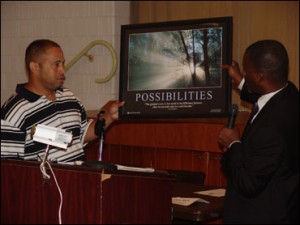State’s treatment court programs gain traction
By: Associated Press//April 15, 2013//

APPLETON, Wis. (AP) – Wisconsin has more than 50 drug treatment court programs across the state, and court officials say momentum is growing to bring the approach to more counties.
Judges, attorneys, social workers and treatment providers work together and set expectations for offenders that include employment and counseling. Participants who fail receive sanctions that sometimes include jail.
Jenny Ingram, president of the Wisconsin Association of Treatment Court Professionals, said one of the challenges is starting treatment courts in lesser populated areas of the state.
“We’d love to see a court in every county, but it takes a lot of time and a lot of resources to make it happen,” she told the Post-Crescent.
The group drew nearly 300 people to its annual conference held Wednesday through Friday in Appleton.
Representatives from across the state will hold an event in May in Madison to raise awareness of the programs and to show lawmakers what the courts can accomplish.
Dane County established Wisconsin’s first drug treatment court in 1996. Today, the state has more than 50 programs operating in 28 of 72 counties, and an additional 10 are in the planning stages.
The programs generally are offered to those with a high risk of re-offending but are not offered to violent offenders.
Those who meet their benchmarks receive recognition.
Though treatment courts use shorter sentences as an incentive, Waukesha County Judge Kathryn Foster said many offenders are unable to meet the programs’ high demands.
“Doing the jail time is easier,” she said.
A 10-year study by the National Institute of Justice found the instances of repeat offenses declined between 17 percent and 26 percent among treatment court participants.
Outagamie County has started two new specialty courts since July. The court operates treatment programs for veterans, those with drug and alcohol issues and those with mental health needs. Participants receive a gold star to add to their collars with every positive report. On Wednesday, those who did well also received packets of coffee donated by a local business.
The county recently received an $80,000 grant to pay for a coordinator for its drug and alcohol court.
County Executive Tom Nelson said research shows treatment courts are cheaper than incarcerating offenders and reduce the likelihood of repeat offenses without compromising public safety.
“I call that good governance,” he said.
Information from: The Post-Crescent, http://www.postcrescent.com
Legal News
- Wisconsin attorney loses law license, ordered to pay $16K fine
- Former Wisconsin police officer charged with 5 bestiality felony counts
- Judge reject’s Trump’s bid for a new trial in $83.3 million E. Jean Carroll defamation case
- Dozens of deaths reveal risks of injecting sedatives into people restrained by police
- The Latest: Supreme Court arguments conclude in Trump immunity case
- Net neutrality restored as FCC votes to regulate internet providers
- Wisconsin Attorney General asks Congress to expand reproductive health services
- Attorney General Kaul releases update at three-year anniversary of clergy and faith leader abuse initiative
- State Bar leaders remain deeply divided over special purpose trust
- Former Wisconsin college chancellor fired over porn career is fighting to keep his faculty post
- Pecker says he pledged to be Trump campaign’s ‘eyes and ears’ during 2016 race
- A conservative quest to limit diversity programs gains momentum in states
WLJ People
- Power 30 Personal Injury Attorneys – Russell Nicolet
- Power 30 Personal Injury Attorneys – Benjamin Nicolet
- Power 30 Personal Injury Attorneys – Dustin T. Woehl
- Power 30 Personal Injury Attorneys – Katherine Metzger
- Power 30 Personal Injury Attorneys – Joseph Ryan
- Power 30 Personal Injury Attorneys – James M. Ryan
- Power 30 Personal Injury Attorneys – Dana Wachs
- Power 30 Personal Injury Attorneys – Mark L. Thomsen
- Power 30 Personal Injury Attorneys – Matthew Lein
- Power 30 Personal Injury Attorneys – Jeffrey A. Pitman
- Power 30 Personal Injury Attorneys – William Pemberton
- Power 30 Personal Injury Attorneys – Howard S. Sicula











